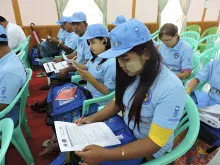UNV Myanmar, in collaboration with UNDP and UNICEF, implements a Disaster Risk Reduction Youth Volunteer (DRRYV) project in support of the Ministry of Social Welfare, Relief and Resettlement. In line with the Sendai Framework, the project strengthens community resilience to disasters through an institutionalized network of skilled and equipped Youth Volunteers across three pilot areas within the country—Ayeyarwaddy, Mon, and Rakhine.
The 4th kick-off event took place on 25 April in Sittwe, Rakhine State, and gathered more than 60 participants, including State Departments representatives, Disaster Risk Reduction Working Group members, and Sittwe Youth Volunteers.
Engaging with community members, Youth Volunteers assessed disaster risks across the three pilot areas. Many identified fire, flood and cyclone as the main hazards to which their communities are vulnerable. They also discussed the need for activities at the local level to raise awareness on Disaster Risk Reduction (DDR) and increase their communities’ knowledge and skills on this subject.
During the event, Youth Volunteers also shared the reasons that push them to volunteer and become a part of this DRR Youth Volunteers’ Network. Not surprisingly, volunteerism is a principle anchored in Myanmar’s culture and tradition. In Myanmar, volunteerism is understood as “benefiting oneself in serving for the benefit of others”. Volunteer networks have typically played a key role in providing services and support needed by communities, which means that volunteers are generally highly respected by the local population.
Mi Mi, 29, is one of the young women that shared her experience. “My motivation is to share DRR awareness raising and knowledge with community residents after the training,” she explained. Similarily, Kay Chit Maung, who joined the project at the age of 33, also believes that DRR is necessary for community resilience. Khine, 20, a university student and a newcomer to DRR Youth Volunteers, explains, "Women volunteers reached nearly 70% of the population in my community. In addition to expanding my own knowledge of disaster risk reduction and transferring it to the others, I would like to learn how to do social work and encourage more women to join the Network in my community."
Working in the UNICEF field office in Mawlamyine, Anne-Cecile Vialle talks about how the project is expanding DRR to other key sectors such as in Education with School-based DRR, Child Protection with prevention of family separation in disasters, or Health. She adds:
This project allowed us to strengthen our relationship with local authorities in charge of disaster management, and provided another avenue for us to work with youth on subjects that matter to them.
The 450 DRR Youth Volunteers trained by the pilot project have become agents of change in their own families and communities. They apply and share their DRR knowledge to help everyone but especially those who need it the most, women, children, the elderly, people with disabilities and people living with illness.
The next events in Rakhine State will take place in Mrauk-u and Kyaphyu Townships in May.

